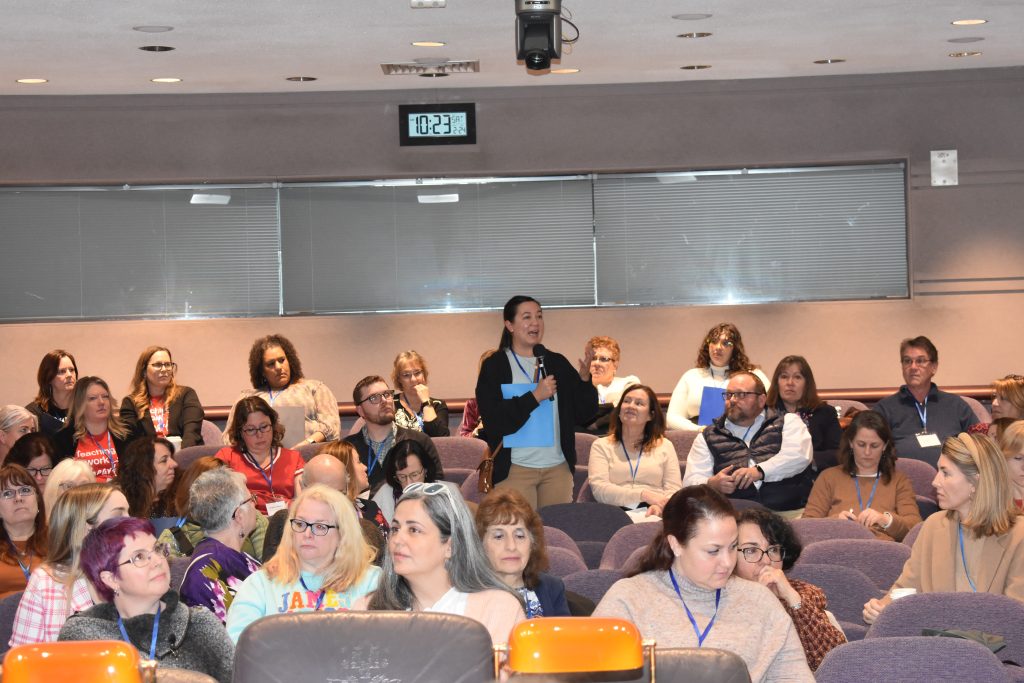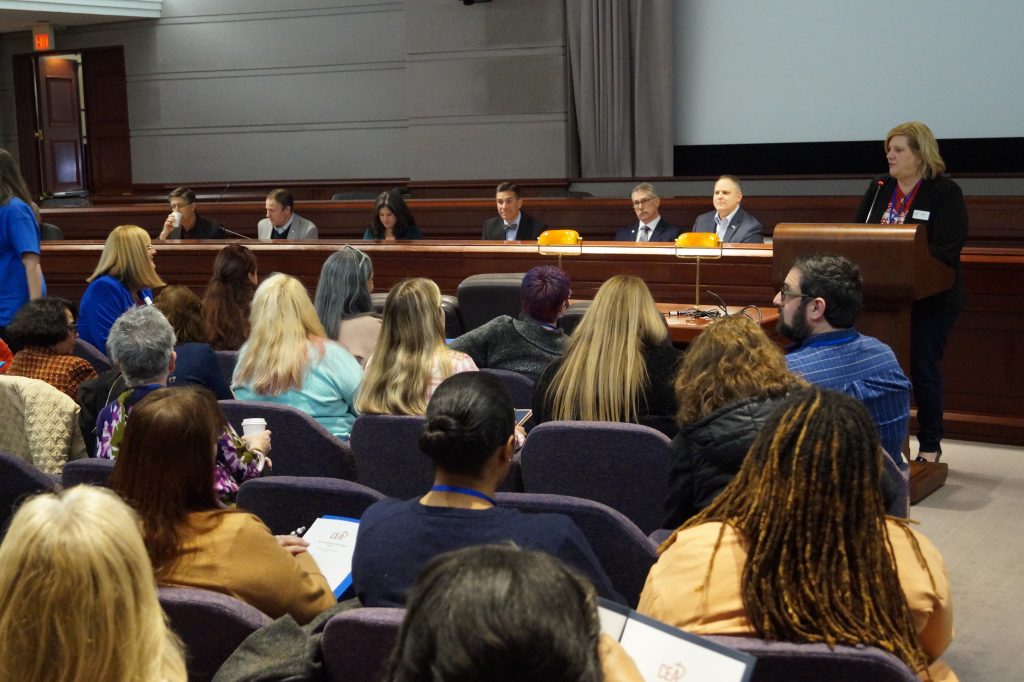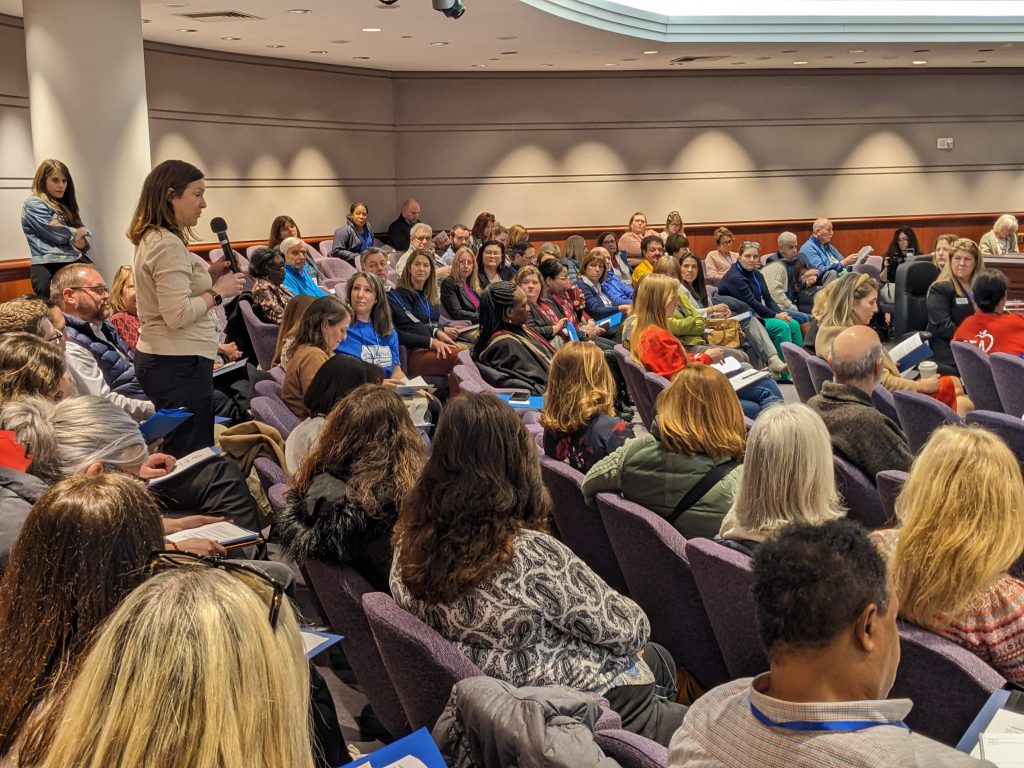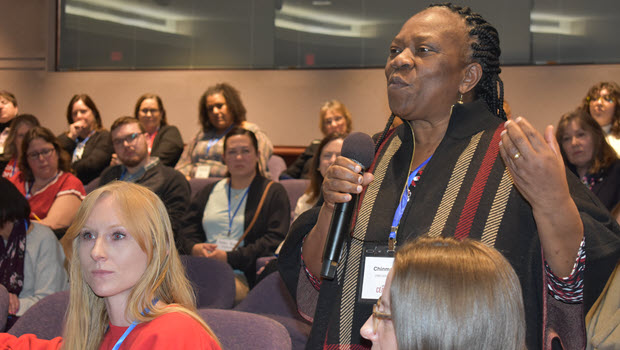As the world moves into a post-pandemic era with fewer restrictions and a return to familiar ways, educators continue to experience the long tail of COVID: greater numbers of highly dysregulated students, heavier workloads and caseloads, children entering preschool and the early grades lacking the verbal, social, and emotional skills they need to succeed, and politicians and parents who once held teachers up as heroes now forgetting or, worse, attacking them.
Educators from every part of the state came together at the Legislative Office Building on Saturday, February 24, to ensure Connecticut lawmakers understand not only the myriad challenges teachers took on during the pandemic and the impacts that persist today but also issues related to teachers’ pay, working conditions, retirement, and more.
CEA’s second annual Breakfast with Legislators was a chance for members to share their stories firsthand with their elected officials and ensure that their needs and those of their students are front and center this legislative session.
“This is a really awesome opportunity to give voice and tell the stories our legislators need to hear,” CEA President Kate Dias told members. “You have stories to tell that make all of this real. Legislators are going to wonder why COVID is still on our list of things to do, because they think, ‘It’s over, right?’ We have to remind them of the work we did and continue to do to get our students and families through the pandemic and beyond. The sting of never acknowledging public educators as first responders is very real.”
Citing the recent Dalio Education report on Connecticut’s disconnected youth, Dias noted, “These are 119,000 kids we all know. They sit in our classrooms, or they skip our classes. And we are working super hard to build safe spaces for them.”
Above and beyond
Bloomfield Education Association President Gail Jorden, who lives with multiple sclerosis and contracted COVID five times while teaching through the pandemic, spoke of the great lengths her colleagues went to in order to give their students the most positive, productive learning experiences at a time of great uncertainty and risk.
“One of our band teachers knitted coverings for all her students’ woodwind instruments so that they could continue to play safely,” she recalled. “I had colleagues go to students’ homes to provide tutoring outdoors. We really stepped up, and we know in our hearts why we did all of it, but some acknowledgement from our state’s governing body would be huge. To be overlooked for our efforts while other workers were rewarded has felt like a kick in the face. It’s really turned a lot of people away from teaching.”
Among the priorities CEA continues to ask legislators to address is the need for COVID-19 hero pay for teachers.

Glastonbury Education Association President Kristen Basiaga was one of many educators who spoke to their lawmakers on Saturday.
“We were really on the front lines of the pandemic before vaccines were available, with teachers seeing 20 to 30 students a day at close proximity in the elementary grades, and hundreds at the high-school level, all putting educators at heightened risk of infection,” Glastonbury Education Association President Kristen Basiaga reminded legislators. “The fact that teachers remain largely unacknowledged is a big reason we’re seeing so few people going into education now.”
Rep. Jill Barry, who represents Basiaga’s teaching town, was among a dozen lawmakers at CEA’s breakfast, a group that also included Representatives Amy Morrin Bello, Mike Demicco, Kate Farrar, Bill Heffernan, Kevin Ryan, CEA members Kevin Brown, Ron Napoli, and Chris Poulos—who serve on the legislature’s Education Committee—and Senators Derek Slap, MD Rahman, and Education Committee Co-chair Doug McCrory. Committee Co-Chair Representative Jeff Currey, a strong ally for teachers, was unable to attend because of a conflict but pledged his ongoing support.
Money matters
Teachers thanked legislators for turning out to listen and asked them to continue paying attention to educators’ shared experiences. In addition to recognition for the difficult, necessary work teachers put in at the height of COVID and in its aftermath, educators talked about the need to fully fund schools, provide competitive teacher salaries that draw people into the profession and keep them there, and enhance the state’s commitment to funding a pension system that honors retired teachers and helps attract and retain a diverse educator workforce.
When Dias asked how many teachers face education budget shortfalls in their districts, for example, nearly every hand went up.

CEA President Kate Dias welcomed educators and lawmakers to the second annual Breakfast with Legislators.
Amity Region 5 social studies teacher Peter Downhour—who sits on the board of education for Hamden, an Alliance District—emphasized that every dollar matters. He added, however, that education funding does not usually make it to teachers, meaning that salaries are not increased to make the profession more attractive, and shortages persist.
“If you look at our legislative priorities, we want you to set a minimum starting salary for teachers that boards of education can’t change or redirect,” Downhour said. “We are asking for a COVID credit—something that goes directly to us and is more than a pat on the back.”
“I want to impress upon you the ongoing impact of COVID on both students and educators,” said Jennifer Parker, who started her career as an elementary teacher before moving to special education and has spent the past 15 years as a CREC elementary school social worker. “Our kids are showing up in classrooms carrying the weight of familial and other losses, just as their teachers are, and teachers have been coping with and teaching through all of it without recognition and support. This is what keeps the COVID credit on the table and makes it so important.”
Return to good faith reporting
Avon Education Association President Jon Moss and CREC President Lisa Cordova were among many educators who spoke to the need for DCF reporting reforms, calling for commonsense, good faith reporting that protects children, teachers, and families. Current rules, they explained, force overreporting that strangles the child protective system and does lasting damage to families and school-family relationships, as well as teachers’ reputations and careers. Even if child abuse or neglect is highly unlikely, teachers are compelled to initiate hundreds of DCF reports each year that lead to unnecessary and often devastating investigations. While the vast majority of reports are unsubstantiated, failure to report even the slightest issue could result in a felony conviction for a teacher.
Teachers also find themselves on the receiving end of false reports that disrupt their lives and derail their careers. Recently retired teacher Gary Peluchette recalled that in his last year as Bridgeport Education Association president, “We had 60 DCF referrals in Bridgeport—60 teachers automatically put out on administrative leave anywhere from 10 to 45 days, depending on the length of the investigation. I would go down to city hall and watch grown men cry because they thought they were losing their careers. The school system had to pay for substitute teachers with money it didn’t have, so classes often didn’t get covered. At the end of the year, all but one of those 60 cases were unsubstantiated. The whole thing is tragic.”
 After a broader conversation with lawmakers that encompassed topics ranging from WEP/GPO to representation on the State Teachers’ Retirement Board, educators were invited to have one-on-ones with their representatives and senators.
After a broader conversation with lawmakers that encompassed topics ranging from WEP/GPO to representation on the State Teachers’ Retirement Board, educators were invited to have one-on-ones with their representatives and senators.
“It was great for teachers to have a chance to share their experiences,” said CREC teacher Chinma Uche.
Representative Poulos gave a shoutout to his own mentor from 24 years ago, a retired educator who came to advocate for her colleagues.
“My mother was a teacher for 35 years, and I remember spending hot August days in her classroom putting up bulletin boards and her grading papers at eight o’clock at night, so I understand a little about your work and all the challenges you face, and I want to thank you for all you do,” said Representative Morin Bello, adding that because she does not serve on the Education Committee, she relies on teachers and her legislative colleagues to keep her informed on current education issues.
“This day offered great discourse, and I appreciate teachers sharing their stories and legislators who care enough to listen and hopefully act on our behalf,” said Milford teacher Kellie Choquette. “It’s also heartening to have teachers who serve as legislators in some communities. I’m grateful to CEA for their tireless efforts to improve teaching and learning conditions for all of us.”
Region 13 school librarian Jenny Lussier said she was happy to meet fellow CEA members and lawmakers in person. “Certified school librarians have specific issues in addition to many of the issues discussed that I wanted legislators to know about, and this was an important chance to tell my story.”
“I loved being in person with other teachers from around the state and feeling validated with so many thoughts I have been having related to public education,” said Bridgeport teacher Jessica Baldizon.
“It was a fantastic experience,” said East Hartford teacher Sloane Stefanik. “Everyone spoke with passion, compassion, and honesty, and legislators were responsive and receptive. I learned a lot about what still needs to happen to support educators now and in the future.”







